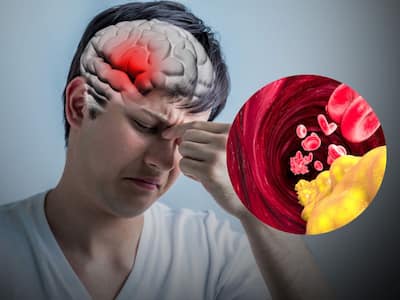
High cholesterol is a serious condition, but it is manageable.
High cholesterol is a common condition that can have serious health consequences. It’s often called a “silent killer” because it doesn’t usually cause any symptoms. However, over time, high cholesterol can build up in your arteries and clog them. This can lead to heart attack, stroke, and other health problems. Today, in this article, we will take a close look at what may happen inside your body when you fail to control your blood cholesterol levels. Also, we will talk about some effective home remedies that can naturally help you control LDL levels.
But before we get into what uncontrolled high cholesterol can do inside your body, let’s take a quick look at the signs and symptoms of high cholesterol.
Don’t Ignore the Cholesterol Warning Signs
Although known by the name ‘silent killer’, high cholesterol can sometimes lead to visible changes in the way your body usually looks, or behaves. Some of the things that may happen when you are suffering from excessive bad cholesterol levels are:
- Extreme fatigue
- Nausea and vomiting
- Chest pain
- Numbness
- Skin issues, such as skin tags
- Yellow deposition in the eye regions
- Unsteady gait
- Slurred speech
- Pain in the lower legs
- Shortness of breath
Apart from these signs, high cholesterol levels can also show up symptoms on your skin and other body parts. Click here to know more: High Cholesterol Symptoms
The Dangers of Uncontrolled High Cholesterol
LDL cholesterol, or low-density lipoprotein cholesterol, is frequently referred to as “bad” cholesterol due to its propensity for producing plaque in the arteries. Sticky buildups called plaques make the arteries smaller and reduce blood flow. This may result in a variety of health issues, such as:
Heart Attack
Excessive bad cholesterol in the blood can cause problems with the heart’s function, leading to heart attacks. A heart attack occurs when a blood clot blocks blood flow to the heart muscle.
Stroke
Uncontrolled cholesterol levels can also increase your chances of suffering a stroke. A stroke occurs when a blood clot or burst artery blocks blood flow to the brain. You must keep a close check on the body and the signs that may show up when you are at risk of suffering a stroke.
Peripheral Artery Disease
Peripheral artery diseases can affect the arteries in the legs and feet. This can eventually lead to the signs and symptoms of high cholesterol in the feet and legs. It can cause pain, numbness, and tingling in the legs and feet, especially when walking.
Aneurysm
Another severe health condition that uncontrolled high cholesterol levels can lead to is an aneurysm. It is a bulge in a blood vessel. Aneurysms can burst, causing life-threatening bleeding. When left untreated this condition can even kill the patient within seconds.
Kidney disease
Yes, you read that right! High cholesterol can cause severe damage to the arteries in the kidneys, leading to kidney disease. In some rare cases, uncontrolled cholesterol can also damage the kidneys completely.
READ RELATED: Vitamin A Diet: Why Are They Important For Your Health?
Reverse the Damage: How to Lower Your Cholesterol and Improve Your Health
High cholesterol can also lead to organ failure if proper care is not taken on time. Here are some easy tips to keep your LDL levels under control:
Eating a healthy diet
One of the first lifestyle changes that you must do in order to keep cholesterol levels under check is eating right. Try to add plenty of fruits, vegetables, and whole grains to your daily diet. Limit your intake of saturated and trans fats, cholesterol, and sodium.
Exercising Regularly
You must know the importance of maintaining body weight when trying to control cholesterol levels. Aim for at least 30 minutes of moderate-intensity exercise most days of the week.
Managing Stress
Yes, stress can have severe consequences on your overall health when you are suffering from high cholesterol levels. Stress can raise your LDL cholesterol levels. Find healthy ways to manage stress, such as yoga, meditation, or spending time in nature.
Your doctor could recommend medication if making lifestyle changes alone are insufficient to lower your cholesterol levels. The most popular class of drugs used to decrease cholesterol is statins. They function by preventing the liver’s ability to produce cholesterol. Learn more about statins and how they can be used to control cholesterol levels HERE.
Disclaimer: The home remedies given above are just some suggestions and tips to manage the condition. Do not ignore the symptoms if they persist for a long time. Make sure you consult a doctor before making any changes to your diet.
Total Wellness is now just a click away.
Follow us on
Don’t Miss Out on the Latest Updates.
Subscribe to Our Newsletter Today!
window.addEventListener(‘load’, (event) => {
$(‘#commentbtn’).on(“click”,function(){
(function(d, s, id) { var js, fjs = d.getElementsByTagName(s)[0]; if (d.getElementById(id)) return; js = d.createElement(s); js.id = id; js.src = “//connect.facebook.net/en_US/sdk.js#xfbml=1&version=v2.3”; fjs.parentNode.insertBefore(js, fjs);}(document, ‘script’, ‘facebook-jssdk’));
$(“.cmntbox”).toggle();
});
});








